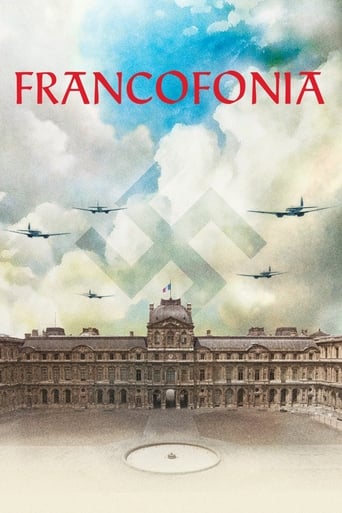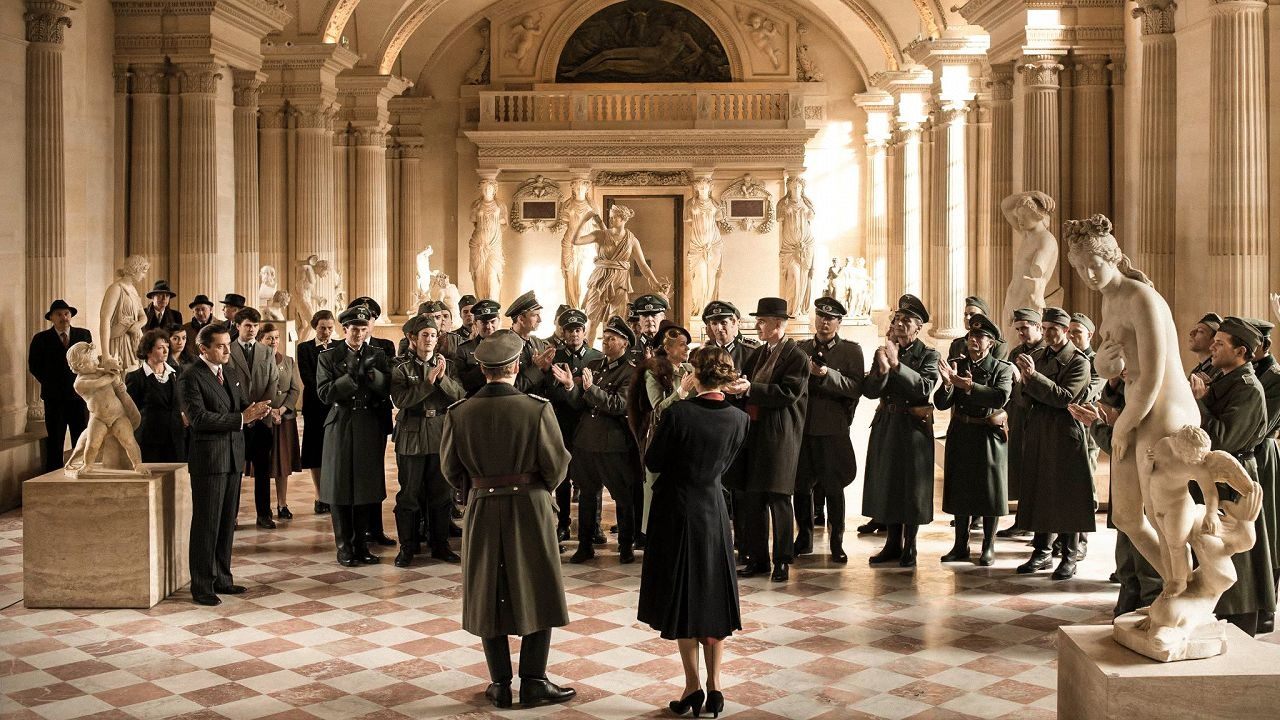Barbouzes
I am sorry to say: what a chore. Who is Sokurov and how does he get any producer to give him money to produce such drudgery? The man had already lost track (and sight) of his audience when he inflicted on it his overly long and deliberately confusing "Russian Ark", whose only redeeming value was its one terrific camera trick. Russian Ark, as a historical documentary, had no substance, no coherence, and displayed both huge gaps and bias. Alas, here is our mad Russian director at the task again , examining this time the Louvre museum, and extemporaneously droning on
well, what exactly is his topic? A mishmash of disconnected anecdotes, vague philosophical remarks, ridiculous or pompous -and mostly reactionary- statements on art and history. And, as he did in Russian Ark, he reprises his lethal habit of using as our "guide" an annoying character about whom we know nothing and care little about. In Russian Ark, it was an exasperating curmudgeon who literally whined about everything from room to room; Here, it is apparently Sokurov himself, seen only in silhouette as the narrator, speaking via Skype to a mysterious ship captain named Dirk, or via camera to count Wolff Metternich, or more often than not, to himself indeed while preaching to his captive theater audience. For every one good idea, 10 bad ones kick it off the screen. In the 1950s in France, was a filmmaker/playwright/actor and bon vivant named Sacha Guitry who produced, directed and acted in many self aggrandizing movies about France history ("Si Versailles m'était Conté"is the most famous), but while picking and choosing his anecdotes as director and acting in them as the narrator - like Sokurov- Guitry was always witty, fast and light on his feet: he never lost track of his audience's needs and pleasure. History was his pretext, entertainment his goal. Mr Sokurov
is no Sacha Guitry. I venture to say that, between the mysterious Captain Dirk recurrently moping on his ship, "Marianne" trolling around the Louvre with her ecstatic and repeated utterance of "Liberty, Egalité, Fraternité", and Napoleon himself running around the Louvre like a petulent child bragging "it is me!", one can actually question the sanity of the director responsible for a script as sophomoric as this. I saw the film in a Berkeley theater: the movie went on for what seemed like 4 hours -when it is only 90 minutes. Those were 90 minutes I never wish to waste again.
billmarsano
Sometimes what we've seen before is enough. Director/ Writer Aleksandr Sokurov, who did so well with 'The Russian Ark,' a seamless, one-long- take tour of the Hermitage, does fails heavily with the Louvre. The computerized opening is mere gadgetry; a sour Napoleon brags about the art he stole for the Louvre; Marianne, the personification of France, appears serially, glumly droning Liberté, Égalité, Fraternité rather too often. Earlier Mariannes (e.g. Bardot, Deneuve, Casta) were at least lookers. Too much time is spent on stuff long-since covered by 'Monuments Men' and at least one TV documentary on the Nazi occupation and art looting. As nothing new is added, 'bored stiff' will have a literal meaning unless your theater has really good seats.
Mike B
This is an odd film – strangely constructed. It's on the avant-garde side, and poetic. It's definitely not a touristy look at the Louvre.The focus (and this film is sometimes out of focus) is on the Louvre during the German occupation of Paris in the war years. There are fictitious historical re-enactments of the key French and German figures who were involved with the Louvre – and this works. They are long forgotten and the film-makers gives' them a new lease on life. The Napoleon figure was entertaining too!There are mysterious side-bars that crop up in this film. I could not for the life of me understand the interruptions showing a container ship caught in a North Atlantic storm. The conversations were with a man named Dirk speaking in English and with the director speaking in Russian.Of interest for museum aficionados and those interested in 20th century French history.
cyber-butt
Having seen and loved Sokurov's earlier film "Russian Ark", I found "Francofonia" a disappointment.While "Russian Ark" also switches its scenes from one historical period to another, in that film it all came together into a coherent whole through its setting inside the Hermitage, as well as by its groundbreaking single take. "Russian Ark" was an astonishing cinematic tour de force. In comparison, "Francofonia" is just an incoherent jumble of unrelated thoughts.The theme that gets the most attention in "Francofonia" is the period of the German occupation of Paris in WW2, when the Louvre's collection was evacuated and stored in various chateaux and other locations throughout France as a precaution against the chance that Paris would be bombed later in the war. Interspersed with this is a series of vignettes on mostly unrelated subjects. We see the emperor Napoleon telling the viewer how the best of the Louvre's art collection was brought to France by him as spoils of war; footage of Hitler being escorted around Paris to admire the Eiffel Tower, the Champs Elysées and other monuments; scenes from the siege of Leningrad; a bit on the policies of Marechal Pétain, leader of the collaborationist Vichy government; a history of the Louvre building since its beginnings as a fortress in the middle ages; and a lament about the risks of transporting art treasures in ships over the high seas. Throughout the film we hear the voice of the narrator, speaking in Russian.It all comes across as a dose of revisionist history, where the underlying message seems to be: "The French were smart and did themselves a great favor by going along with the German occupation during the war, as witnessed by the fact that the Germans kept their hands off the Louvre's collection so that it survived the war intact. The Nazis were very cruel to us Russians, but on the whole they were not so bad." I didn't buy it.


 AD
AD



